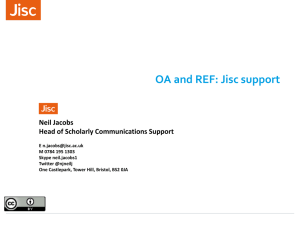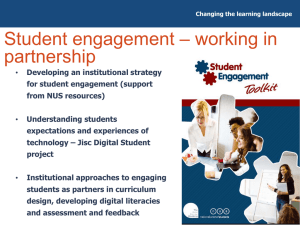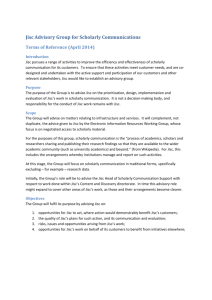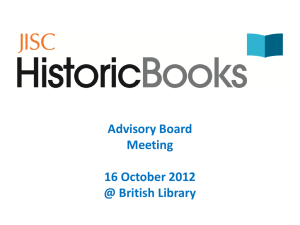building capability programme
advertisement
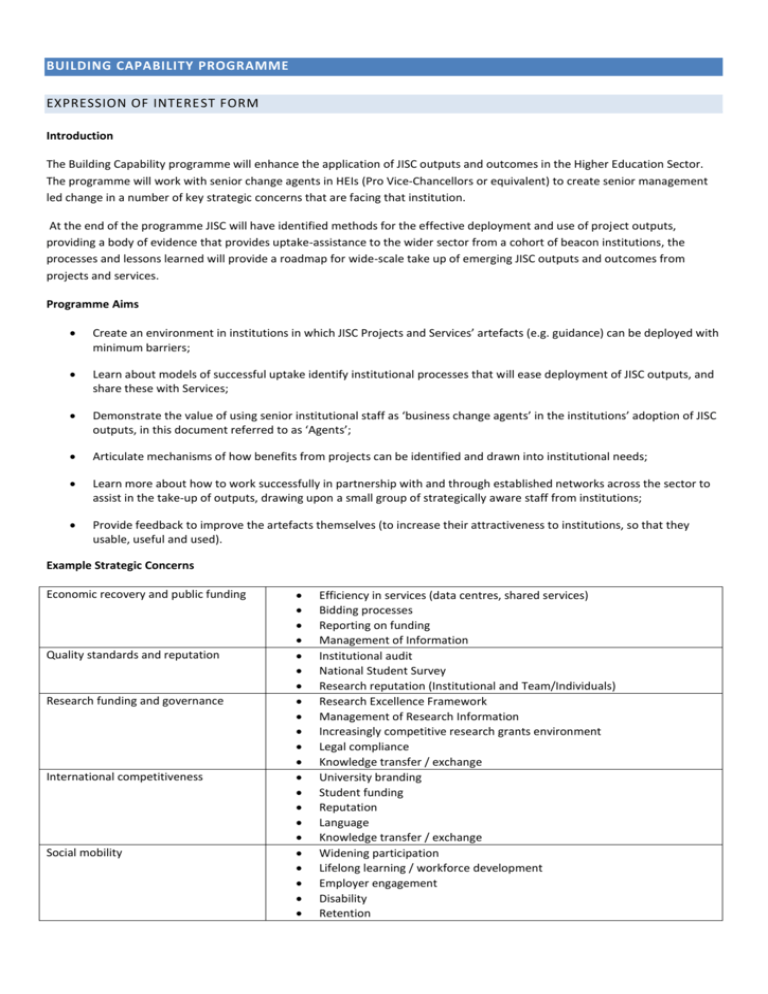
BUILDING CAPABILITY PROGRAMME EXPRESSION OF INTEREST FORM Introduction The Building Capability programme will enhance the application of JISC outputs and outcomes in the Higher Education Sector. The programme will work with senior change agents in HEIs (Pro Vice-Chancellors or equivalent) to create senior management led change in a number of key strategic concerns that are facing that institution. At the end of the programme JISC will have identified methods for the effective deployment and use of project outputs, providing a body of evidence that provides uptake-assistance to the wider sector from a cohort of beacon institutions, the processes and lessons learned will provide a roadmap for wide-scale take up of emerging JISC outputs and outcomes from projects and services. Programme Aims Create an environment in institutions in which JISC Projects and Services’ artefacts (e.g. guidance) can be deployed with minimum barriers; Learn about models of successful uptake identify institutional processes that will ease deployment of JISC outputs, and share these with Services; Demonstrate the value of using senior institutional staff as ‘business change agents’ in the institutions’ adoption of JISC outputs, in this document referred to as ‘Agents’; Articulate mechanisms of how benefits from projects can be identified and drawn into institutional needs; Learn more about how to work successfully in partnership with and through established networks across the sector to assist in the take-up of outputs, drawing upon a small group of strategically aware staff from institutions; Provide feedback to improve the artefacts themselves (to increase their attractiveness to institutions, so that they usable, useful and used). Example Strategic Concerns Economic recovery and public funding Quality standards and reputation Research funding and governance International competitiveness Social mobility Efficiency in services (data centres, shared services) Bidding processes Reporting on funding Management of Information Institutional audit National Student Survey Research reputation (Institutional and Team/Individuals) Research Excellence Framework Management of Research Information Increasingly competitive research grants environment Legal compliance Knowledge transfer / exchange University branding Student funding Reputation Language Knowledge transfer / exchange Widening participation Lifelong learning / workforce development Employer engagement Disability Retention This form is an iterative document that will serve as the basis for both a workplan and funding letter. If you require any information, or assistance in completing it please get in touch with Lawrie Phipps, Programme Manager (l.phipps@jisc.ac.uk) or Craig Wentworth, Programme Director (c.wentworth@jisc.ac.uk). Name University Role Prof. Geoff Layer DVC (Academic) University of Bradford Contact details The programme manager will need to get in touch and clarify some elements of this form, please provide a telephone number and email. Dean of Students Becka Currant Area of Strategic Concern to be addressed The goal of this project will be to deliver an integrated web/mobile support system that relates to the three major corporate aims listed below and which will produce identifiable gains in terms of both student attendance and engagement/retention. Our Corporate Strategy “Making Knowledge Work 2009-2014” http://www.brad.ac.uk/publicationscheme/media/PublicationScheme/making-knowledge-work-2009.pdf outlines our key institutional aims for this period, a number of which are relevant to this call. The first aim of our corporate strategy is to “provide all our students with a first-class learning experience” and our participation in this programme will be an important enabler. There is much we can learn from current JISC programmes such as Curriculum Design and Delivery and we can identify both general areas, such as the use of mobile technology to improve feedback to students, and work in specific projects (e.g. the use of online tutorials in the COWL project) which relate to our strategic aims and current practical issues. There is also the potential to make further improvements in areas where our own JISC projects have made important progress (e.g. work in e-portfolios – ELP1,2 - computer-aided assessment – IT4SEA – and employer engagement – WELL)). The project will contribute towards this strategic aim by creating technology enhanced pedagogies which lecturers can use to embedded mobile learning within their courses. These pedagogies will make use of the outputs from the following two strategic goals of the project. Aim 4: 'to invest in the welfare and support of our students ...' Most if not all higher education institutions across the UK are wrestling with problems of measuring/specifying student attendance in ways which are both efficient and effective. As well as relating to issues of legal compliance (e.g. with health and international students), this has important implications for student engagement. For example, the importance of identifying 'atrisk' students early in their course has been demonstrated in several initiatives. This depends on reliable data which is correlated with engagement. The University is currently exploring different technological solutions to the measurement of student attendance and is ideally looking for some system which offers value-added benefits in terms of its potential use for educational purposes. For example, it has been suggested that student response systems, if implemented systematically on an institution wide basis, could automatically monitor attendance while providing lecturers with significant educational opportunities that do not require additional labour-intensive tracking of students. Our other key aims also fit very clearly into this programme, as for example – “AIM 6 To deliver professional and customer-focused services and an appropriate and supportive infrastructure which communicates, guides and governs effectively ... C18 By providing robust , innovative and supportive IT and administrative services and systems alongside processes which are adaptable to change and which support and enable flexible modes of learning and working; C20 By providing high-quality and responsive student services and spaces which reflect the diversity of our student population and their study and work patterns” Our IT Strategy is informed by the Corporate Strategy and included a more detailed Vision Statement for how we will achieve this: “The Corporate Strategy 2009-14 will be enabled by emerging mobile, self-service capabilities provided by information technologies and systems, which will deliver the three themes: Web enabled campus supported by wireless and mobile computing (infrastructure) Smart administration for flexible learners (administration) Communicating in the information age (curriculum)” In particular, we wish to develop our initiatives in mobile and flexible learning, alongside our commitment to inclusivity. As part of this strategy, the University of Bradford has recently procured CampusM, a mobile service that uses a web page or native application that gives access to University administration systems, alerts / news, Library and IT services. To implement this solution we are required to expose existing systems as web services. There are other similar products (e.g. Blackboard Mobile Centre) in use across the sector, and many other institutions developing web services. Rather than “re-inventing the wheel” we propose to do a literature review of previous JISC projects to see if we can make use of any processes, products, techniques or other methodologies that can help us to develop these services. As many Universities’ use or are looking at similar products or have it may be that some of work will be directly transferable. As well as the work that will specifically look at web services, we would also review more general mobile projects produced for JISC in the hope of identifying work that can be done to compliment the rollout of the system such as further development of our existing mobile web presence www.braduni.mobi The end result of this project should be that students will be able to access administration systems, and teaching and learning content from their personal mobile devices. It is envisaged that access will be provided through a combination of native mobile applications and web based services. We believe that by improving access to systems in this way that it will improve engagement on their courses and lead to improved retention which is a key strategic goal for our organisation. By using the mobile systems in classes students will also be providing evidence of their participation and attendance in classes and it’s possible that we could incorporate this into an attendance monitoring system. This form must be returned to Lawrie Phipps, l.phipps@jisc.ac.uk, if you do not get an acknowledgement of receipt, please contact Lawrie on 07775 900 635.

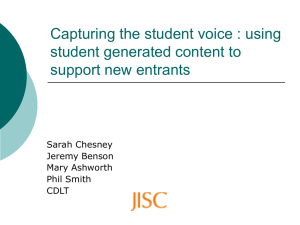
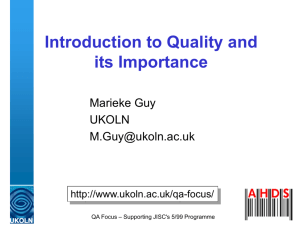
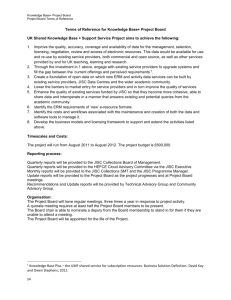
![Selecting_MLEs[1] - Study Net](http://s3.studylib.net/store/data/009211688_1-7ea1360b639a57afdad49a12c2f1e371-300x300.png)


